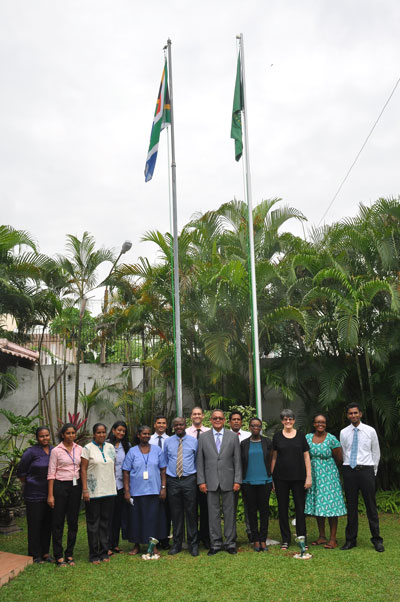Saturday Feb 21, 2026
Saturday Feb 21, 2026
Saturday, 24 October 2015 00:04 - - {{hitsCtrl.values.hits}}

South African High Commissioner in Sri Lanka G.Q.M. Doidge with his staff after the hoisting of the African Union flag at the South African High Commission office
– Pic by Shehan Gunasekara
The new African Union flag was ceremoniously unveiled and hoisted yesterday in Colombo by South African High Commissioner G.Q.M. Doidge, who highlighted the strong historical links between Sri Lanka and the Africas.
“We are proud to announce that immediately after the recent 25th African Union Summit held in South Africa;South Africa’s President Jacob Zuma decreed that South Africa’s National Flag be permanently flown together with the African Union Flag in all Government buildings including at all our diplomatic missions abroad.
In keeping with the guidelines we today we hoist for the first time, the AU Flag as directed,” Doidge told the ceremony yesterday at the South African High Commission.
Africa Day is celebrated on 25 May every year by all six African Missions in Colombo. From yesterday the African Union Flag will be permanently flown with National Flag at the South African High Commission here in Colombo.
During the ceremony Doidge also recalled that history is replete with examples of Sri Lanka’s connections with the African continent.
The earliest links through the silk route with many ancient civilisations of Africa are indicative of the long standing trade linkages with Sri Lanka, and the records in the Mahavansa – the Great Chronicle – mentions the presence of Northern African merchants in the ancient city of Anuradhapura in the 11th Century during the reign of King Pandukabaya, are but a few of the ancient linkages.
Sri Lanka’s relations with the African region are characterised by strong trade links, traditional friendship, mutual respect and strong African-Asian solidarity in the Non-aligned Movement and the Commonwealth.
“We continue to be partners in newer international organisations such as IORA, G-15 and many other fora, bringing together a unique blend of development, social and cultural experience. Sri Lanka enjoys formal Diplomatic relations with no less than 41 African countries, and there are six resident Sri Lankan missions on the African continent and Sri Lanka has observer status in the African Union,” he said.
“We share common values, economic and trade ties, socio-economic aspirations, political ethos, and continue to grapple with similar developmental challenges of our times. The African Union’s values of diversity, transparency and unity strike particular resonance with the people of Sri Lanka,” the South African High Commissioner added.
He said the African Union was originally established in 1963 as the Organisation of African Unity OAU, to eradicate colonialism and improve economic, cultural, and political cooperation in Africa. Its headquarters are in Addis Ababa, Ethiopia. The African Union comprises 53 member states representing virtually the whole of the central, southern, and northern Africa.
The African Union, which replaced the OAU at the Assembly Heads of State in Durban, South Africa on 9 July 2002, its first chairperson being former South African President Thabo Mbeki. The African Union adopted and unveiled a new flag at its 14th Ordinary Session of the Assembly of Heads of State and Government in Addis Ababa, Ethiopia in 2010. The vision of the AU is aimed at increased cooperation on trade and integration between member states. In recent times the focus has focussed on in integrated economy on the continent.
The South Africa hosts the Pan African Parliament at Gallagher Estates; this is the permanent seat of the African Parliament (PAP) in Midrand, Johannesburg, Republic of South Africa. PAP was inaugurated on 18 March 2004. The establishment of PAP was inspired by a vision to provide a common platform for African peoples and their grass-roots organisations to be more involved in discussions and decision-making on the problems and challenges facing the continent.
The ultimate aim of PAP is to evolve into an institution with full legislative powers, whose Members are elected by universal adult suffrage. At present it exercises advisory and consultative powers. PAP currently has 230 Members. Midrand, South Africa. The New Partnership for Africa’s Development (NEPAD) which was initiated by Algeria, Nigeria, Senegal and South Africa. Nepad is charged with the responsibility of the Africa’s Renewal.